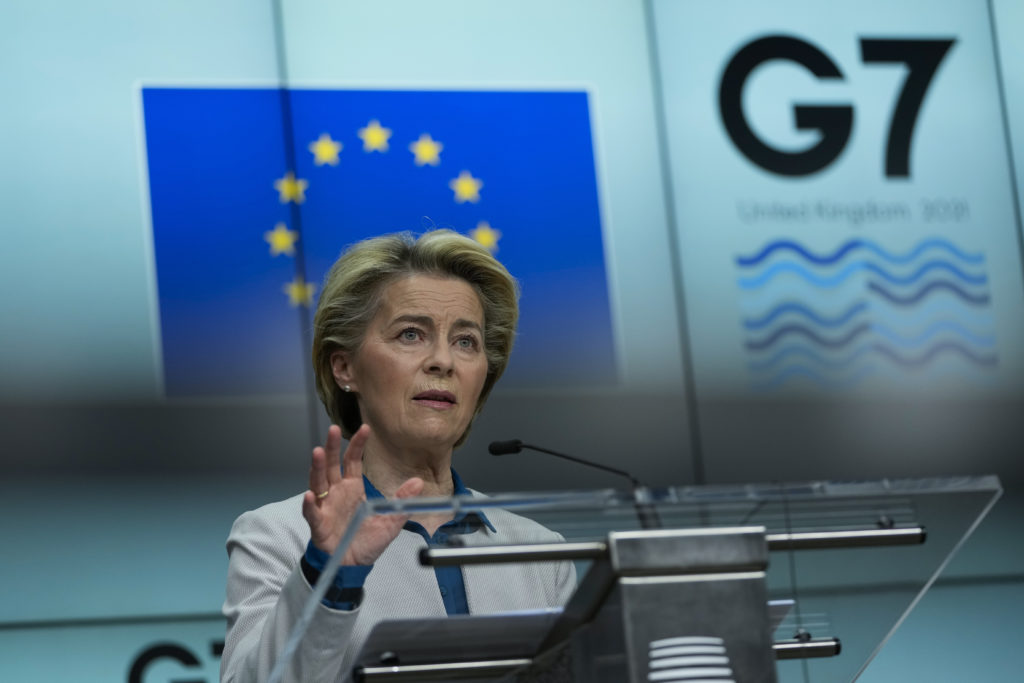Prime minister Rishi Sunak and the president of the European Commission, Ursula von der Leyen, meet today for “final talks” on the Northern Ireland Protocol, after weeks of rumours that a new post-Brexit agreement was close.
Downing Street said Mr Sunak “wants to ensure any deal fixes the practical problems on the ground, ensures trade flows freely within the whole of the UK, safeguards Northern Ireland’s place in our Union and returns sovereignty to the people of Northern Ireland”.
The pair are expected to meet late lunchtime in Berkshire for discussions. Then at around lunchtime cabinet ministers will be updated on the talks. If a final deal is agreed upon, Mr Sunak and Ms von der Leyen will hold a short joint news conference at approximately 3.30 pm. The prime minister will then deliver a statement to MPs in the House of Commons.
The Northern Ireland protocol was introduced as a means of avoiding a hard border on the island of Ireland after the Brexit transition period ended on 31 December 2020.


It has seen Northern Ireland has to stick to some EU rules to allow goods to move freely into the Republic and the rest of the EU.
The trading relationship has angered both Conservative Brexiteers and unionists in Northern Ireland, the largest representative of whom is the Democratic Unionist Party. They argue the agreement creates a border between Britain and Northern Ireland and party representatives have collapsed power-sharing in the six counties until a new settlement is reached.
Downing Street is not expecting an immediate judgement from the DUP after today’s events, with the party likely to take time to study any deal’s details. The party published seven tests for judging whether a deal will be accepted and could therefore allow for a return to power sharing.
Among those Rishi Sunak will be looking to persuade to back his new deal is Jacob Rees-Mogg, former cabinet minister and prominent eurosceptic. He warned this morning that Rishi Sunak’s new Brexit deal may not go far enough to win the support of the Democratic Unionist Party.
While he suggested that the PM had “done very well” to secure a potential deal, the former business secretary said he was “not sure” that the premier will have “achieved the objective of getting the DUP back into powersharing”.
Speaking to ITV‘s “Good Morning Britain” programme, Mr Rees-Mogg said: “From what I have heard, he has done very well but I am not sure that he has achieved the objective of getting the DUP back into powersharing which is the fundamental point of it.”
Mr Rees-Mogg also declined to offer his personal backing for the deal at this stage as he said he would need to read the legal text of the agreement before delivering a verdict because the “devil is in the detail”.
Also intervening this morning was former prime minister John Major who told Conservative Brexiteers to accept a degree of EU legal oversight in Northern Ireland if that is the price for resolving trade issues. The role of the ECJ is expected to be a key sticking among both Conservative eurosceptics and their allies in the DUP upon the announcement of a deal.
Sir John said any role for the ECJ is likely to be “tiny, partial and occasional” and that one issue “really ought not to stop an agreement being made”.
He told BBC Radio 4’s “Westminster Hour”: “What is actually turning out to be a particularly difficult point is the question of what happens with trade disputes. The European Union insists that the European Court of Justice should be involved and that is a neuralgic point for many members of Parliament in the UK, particularly the European Research Group wing of the Tory party and also for the DUP”.
Conservative Eurosceptics, the most notable of whom occupy places in the European Research Group, have warned Mr Sunak against making too many concessions to the EU on any deal.
ERGers want the removal of the trade barriers between Northern Ireland and Great Britain, as well as the complete removal of the ECJ’s oversight of the region. They have also outlined that they do not want laws created by the EU to be put in force in Northern Ireland.
As former cabinet minister and prominent eurosceptic John Redwood tweeted this morning: “The main issue in EU talks is not the occasional intervention of the European Court but the continuous imposition of European law on a part of the UK”.
However, if a new deal is brought for a commons vote, Labour has ensured the prime minister that he can probably rely on their votes.
Shadow chancellor Rachel Reeves told Sky News there should be a debate and vote on any deal to give it “legitimacy”, adding that the prime minister does not have to worry about the “malcontents” within his own party to get the deal passed.
She said: “The best thing would be to have cross-party support from right across the political spectrum for this deal, and I hope that the prime minister can secure that.”

